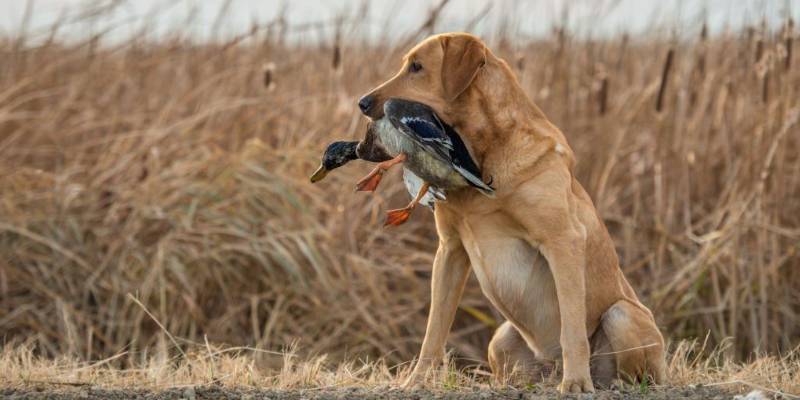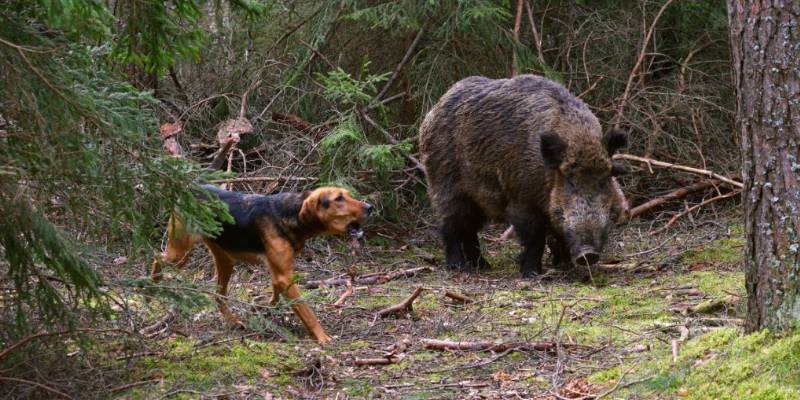
As hunting enthusiasts eagerly anticipate the approaching season, the integral role of a well-trained and prepared hunting dog cannot be overstated. A canine companion, when properly conditioned and equipped, enhances the overall hunting experience, contributing to both efficiency and safety.
This guide provides six essential tips to ensure your four-legged partner is in prime condition for the upcoming hunting season. From physical fitness to specialized training, we’ll cover key aspects to guarantee that your hunting dog is not only ready for the challenges ahead but also a reliable and invaluable asset in the field.
Tips to Prepare Your Dog for Hunting
Let’s see 6 expert tips to prepare your dog for hunting in our step-by-step guide…
1. Effort Management
Summer periods, coupled with intense hunting work, tire the dog. Managing his effort well will allow him to be more efficient during his hunting sessions. Generally, I prefer to do several short rides rather than one long one. It’s ideal for dogs, so they can have recovery times between two sessions. It also keeps them hydrated. A dog will be more efficient with a better-distributed workload.
2. Temperature Regulation
As you may know, dogs don’t sweat, their only method of heat release is through panting. To regulate the temperature, water is the main solution. You can wet your hunting dog as much as possible. This will allow him to bring down his body temperature more quickly. The ideal way is to have a “Can of Water” in the car to be able to spray the dog abundantly in case of heat stroke.
3. Hydration
Hydration is an important factor to take into account during the summer period, and moreover during the dog’s periods of effort. The good thing is that is that he drinks in large quantities after the effort. As in humans, hydration promotes recovery. Of course, regular hydration during exercise is also important. And I think it is important to change the dog’s water often so that it is always clear and fresh.
Can hunting dogs drink anywhere?
Basically yes the dog can drink anywhere but it could lead to diarrhea, so I don’t recommend letting the dog drink from standing water even though it’s hard to control. I therefore try to limit access to puddles of water and prefer to drink it in small streams or even with clear water that I take with me in a flexible collapsible bowl. For this, I advise you to always bring a bottle of water or a water bottle.
4. Food
In order to prevent any risk of stomach upset in dogs, I do not recommend feeding them after exercise. My dogs eat at set times and during the hunting season, you should not deviate from this rule. For me, the evening is the best time to feed them, so they have time to recover from their effort.
5. Treatment & Prevention
Venturing out in hot weather is often synonymous with ticks and fleas on dogs, as well as injuries that may seem benign but are not. Take care to examine them after each outing.
Anyone with a dog should know how to treat their dog against these parasites. First, I advise you to thoroughly brush your companion after the hunt to ensure the presence or absence of ticks and fleas. In the event of the presence of parasites, there are treatments, collars, shampoos, or others that can be obtained from a veterinarian or a specialized store that will allow you to rid your dog of these parasites.
What are the other points of vigilance?
One of the main points of vigilance to have is on the “spikes”, this grass-like plant known according to the regions under different names can cling to the animal’s hair and progress until it penetrates inside the animal’s skin. It is therefore necessary to be very careful with this plant which can also enter the respiratory tract.
6. Vaccines and Other Treatments
To anticipate any problem, updating all vaccines and other anti-parasitic treatments is essential.It is therefore necessary to check on the dog’s health record or with the veterinarian who follows him to find out where he is with his vaccinations.
Care Before Opening
Now we’ll see what care we should give our hunting dog before opening…
Fitness
Your dog can’t be in good shape on opening day if he hasn’t had some training beforehand, especially when the months leading up to hunting season have been sedentary.
Fitness is essential for walking and running along with a diet if your dog has gained a lot of weight. Start this fitness at least 3-4 weeks before opening. The training must be progressive: start with ¼ hour-20 minutes of walking and running per day, to end up with 1 hour per day.
Vet visit
The visit just before the opening is not necessary if you adopt the principle of an annual visit, not only for the vaccines but for the various advice that will then be given to you.
Exception: if you are worried about your dog’s state of health (very significant weight gain, advanced age, recent illness, etc.), a stress test can then be performed.
Deworming
The hunting dog is particularly exposed to all kinds of internal parasites.
Warning! Self-medication for deworming may not be effective enough on a hunting dog. Many products are old. In addition, they are not effective against “flatworms” such as echinococcosis. Effective products are available on prescription.
External parasites
Almost no product actually prevents ticks from attaching themselves to dogs. Some are repellent by their smell, but the latter also bothers the dog by disturbing his sense of smell! In relation to ticks, it is best to inspect and treat them after the hunt. Systematic background protection against other external parasites (fleas, chiggers, etc.) can be provided by a collar or the application of a “pipette” of pest control product.
The paw pads
They are also preparing for the hunt! After the summer rest, the pads of your companion’s paws may be more fragile. It may be useful to prepare them by applying an appropriate product (based on formaldehyde) 3-4 weeks in advance. Ask your veterinarian.
Risks in Hunting Action

It’s opening day! And the big start for a great hunting season. Pay attention to the weather conditions: physical exertion does not have the same consequences for your dog depending on the outside temperature. Watch out for the first weeks of hunting, which are getting hotter and hotter in many regions.
“Who wants to go far … take care of his mount!”.
The heat stroke
There is nothing worse than bringing your dog inside and parking it in an enclosed area (like a car, even with the window ajar) right after the hunt while he is still panting and doesn’t have time to cool down.
In our temperate countries, it is mainly under these conditions that heatstroke can occur (“desperate” gasping, tongue turning blue, etc.). It can also arrive in hunting action in southern regions, during very hot weather. Watering and calming, in the shade and in the air are therefore essential.
Stings, bites
Your companion is likely to have bad encounters during his hunting day: – vipers, bees, wasps, hornets, etc. A dog is bitten by a viper and generally stops hunting and goes to find his master, quite sheepish. He is shot. Bites occur 60% on the muzzle and 40% on the legs. But it is very difficult to spot a trace of a viper bite.
Consequently, the main thing is to observe your dog for 15-20 minutes. If his condition does not improve, it is not “a sudden change” and action must be taken! If possible refresh the dog whose race has accelerated blood circulation (which promotes the spread of venom), by bathing it.
There is no need to resort to ASPI-VENOM which will have no effect on skin covered with hair. The only solution is to take your dog immediately to the nearest veterinarian. A bee, wasp, or hornet sting generally has no consequence, except in the mouth or if it involves multiple stings. If the dog reacts badly, the advice is the same as for the viper.
Processionary caterpillars: they are stinging. If the dog licks them (or licks their support) inadvertently, then his mouth is inflamed and this may motivate a consultation if the phenomenon persists.
Wound care
Always have a first aid kit in your car that contains:
- A bag of saline solution
- A bottle of Betadine
- A clean Velpeau strip (self-adhesive)
- A box of compresses
To clean the wound:
- Clean with clean water or saline solution
- Wash with Betadine. If the wound is deep, you can wash the inside with betadine diluted 10% in saline.
- Rinse with saline solution.
If the wound bleeds heavily and continuously, it is a puncture wound or vascular injury. It is then necessary to make a compression bandage, without waiting to be at the veterinarian.
Veterinary emergency
If an injury or a serious accident requires significant and urgent care, do not go to the veterinarian without calling him first! Always carry the telephone number of the veterinary practice with you and call as soon as possible to let them know you are coming and describe the problem. The more serious the injury, the sooner you need to prevent it! It is on this condition alone that the veterinarian will be able to best treat the emergency when you arrive.
Return-to-hunting care
When your companion has eaten and drunk, general inspection of the animal!
- Remove ticks
- Remove foreign bodies (black thorns, spikelets, etc.).
- Carefully inspect the legs, between the pads.
- Game crop seeds: many of these seeds are likely to seriously irritate your dog’s eyes if he has been through such plots.
This can cause conjunctivitis. Do not hesitate to wash your eyes with clean water. If this irritation is frequent, there is a preventive gel. And do not forget! The dog cleans itself as much as the boots and the rifle!
Conclusion
Ensuring your dog is well-prepared for the hunting season is crucial for a successful and enjoyable experience for both of you. By following these tips, you can enhance your canine companion’s skills and safety in the field. Remember, every dog is unique, and patience is key in the training process.
Read Also…